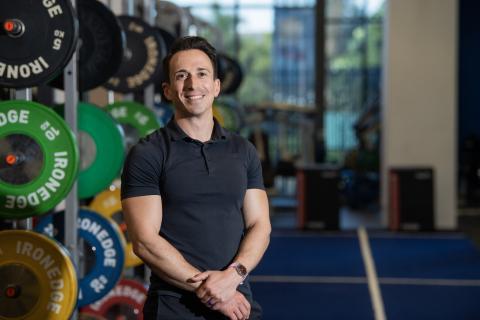While our Olympians take centre stage in Paris for the next few weeks, those of us who are not-so sporty sit back in awe and may wonder, "how did they become so good?"
Perhaps you're a wannabe athlete and blame your parents because they have two left feet and no speed or stamina.
It might surprise you that while some athletes appear born with the physiological weapons necessary to conquer the world, there are many factors which influence their sporting credibility.

It's easy for us to take champions like canoeist Jess Fox and say that with both her parents being world champion paddlers, she inherited the right genes to become a champion.
But that would unfairly ignore the thousands of hours of training, her focus on nutrition and, above all, her winning attitude.
So, to what degree are athletes born to perform?
Consider Usain Bolt, celebrated as the greatest sprinter of all time.
He rose from humble beginnings as the son of grocery store owners and defied the odds to achieve unprecedented success in athletics.
What is it about Usain Bolt that makes him a champion?
One article suggests that his scoliosis a developmental condition resulting in an abnormal curvature of the spine has led to an uneven stride that contributed to his success.
But is this anatomical variation the reason for his record-breaking speed, or has he achieved incredible success despite his condition?
This raises the question: how much of a person's athletic ability is due to nature (genetics) or nurture (training and nutrition)?
Let's review the impact of genetics on performance.
Over 200 genetic polymorphisms have been associated with physical performance, and more than 20 of these may influence the status of elite athletes.
The ACTN3 Gene, often referred to as the "gene for speed", plays a role in determining muscle fibre composition and, subsequently, force production.
There are a few "versions" of this gene. Evidence suggests the RR variant appears more frequently in sprint and power-based athletes, while the XX variant has been associated with an increased response to endurance training, like rowing and marathon running.
The ACE Gene produces ACE, an important enzyme involved in increasing our blood pressure by telling our blood vessels to constrict.
One variant of this gene results in low levels of ACE, producing less constriction of our blood vessels and more oxygen delivery to working muscles.
The other variant produces high levels of circulating ACE, increasing blood vessel constriction, and reducing blood oxygen delivery.
Unsurprisingly, variants of this gene are associated with differences in muscle response to training and recovery.
While genetics alone don't guarantee sports stardom, the influence of genes in areas we once considered purely environmental, such as training and nutrition, are becoming a focus of interest.
While the evidence that genes influence athletic performance is strong, the use of genetic testing to predict athletic performance such as identifying talent at an early age, individualising training programs, and tailoring regimes to promote recovery and avoid sport-related injury is less clear.
Currently, the best we have is the predictability of muscle fibre type with sports performance.
For instance, someone with a higher proportion of fast-twitch muscle fibres might focus on explosive exercises like sprints and weightlifting.
Those with slower twitch fibres may be more successful in slower, longer distance events. In the realm of nutrition, it's evident that physical performance can be significantly influenced by dietary and supplement strategies.
Personalised nutrition has become commonplace for athletes, with dietary modifications often tailored to meet the demands of the sport rather than the individual.
However, it's crucial to consider that individuals exhibit genetic differences in the absorption, metabolism, uptake, utilisation, and excretion of essential nutrients.
For instance, genetic variations in the CYP1A2 gene can affect how an individual metabolises caffeine, the HFE gene regulates intestinal iron uptake, and the MTHFR gene produces an enzyme that converts folic acid to folate.
Variations in these and other genes can negatively impact athletic performance.
This burgeoning field of research, known as nutrigenomics and nutrigenetics, is gaining popularity and holds promising potential for enhancing athletic performance.
However, further research is needed to fully understand and harness these genetic influences.
While our genes strongly control traits such as height, limb length, and body composition, most of our athletic ability is the result of a subtle conversation between our DNA and our environment.
Or to quote the title of Matt Ridely's 2003 book on the subject "Nature via Nurture". Sadly, for the average punter, there is no sports gene.
No cycling gene, no baseball gene, no athletics gene.
So, while genetics may provide a framework for an athlete's career, environmental factors (hard work, coaching and lifestyle) have far more influence in shaping the outcome.
Dr Mike Todorovic is Associate Professor of Medicine at Bond University.